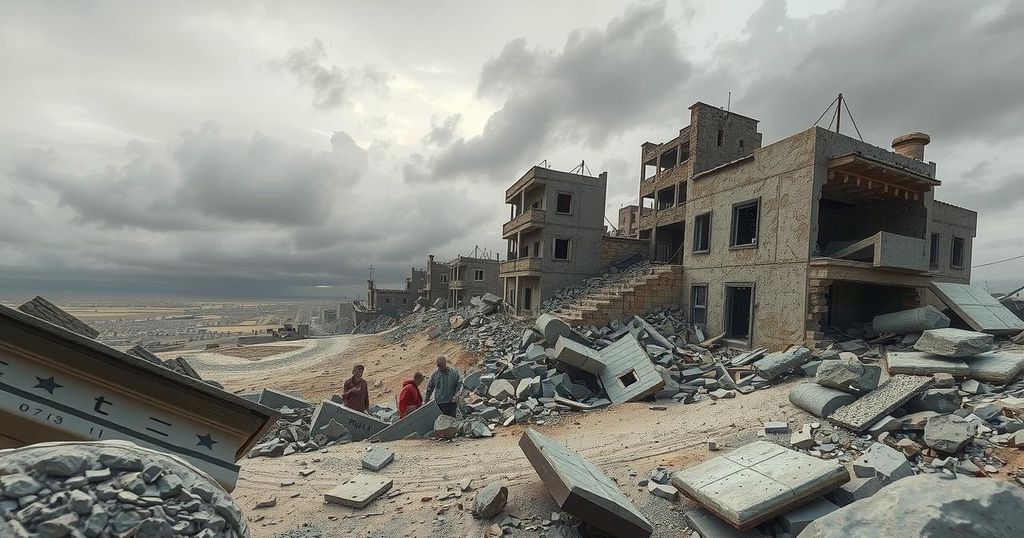Global news
ALI KHAMENEI, ASIA, AYATOLLAH ALI KHAMENEI, DONALD TRUMP, EUROPE, FOREIGN POLICY, FOX NEWS, INTERNATIONAL RELATIONS, IRAN, ISRAEL-HAMAS CONFLICT, ITALY, MIDDLE EAST, NORTH AMERICA, NUCLEAR POLICY, NUCLEAR WEAPONS, OBAMA, ROME, SANCTIONS, STEVE WITKOFF, TEHRAN, U. S, UNITED, UNITED NATIONS, UNITED STATES, WASHINGTON, WHITE HOUSE
Isaac Bennett
0 Comments
U.S. and Iran Nuclear Negotiations Progress in Rome Amidst Tensions
U.S. and Iran officials are engaged in nuclear talks in Rome, focusing on uranium enrichment. Iran claims its program is peaceful, while the U.S. demands assurances against nuclear weapons development. Despite constructive dialogue, challenges remain, particularly concerning a possible U.S. ban on enrichment, which Iran has rejected. Future discussions will move to Washington and Tehran, amidst fears of military action should negotiations fail.
Negotiations between U.S. and Iranian officials are underway in Rome, Italy, focusing on Iran’s nuclear program. Iran maintains its position that uranium enrichment is intended for peaceful, civilian purposes, while the U.S. aims to ensure that there are no clandestine efforts toward nuclear weapons production. Reports suggest that discussions have been productive, although concerns persist regarding a potential U.S. call to ban all Iranian nuclear activities.
Iran’s Supreme Leader, Ayatollah Ali Khamenei, has publicly rejected any such ban from the White House, making it clear that he will not agree to terms that include halting uranium enrichment. However, the White House has yet to confirm whether it is indeed pressing for a complete freeze on Iran’s enrichment efforts. It is worth noting that uranium is essential for both civilian nuclear energy and weapons, complicating these discussions.
During Friday’s negotiations, which marked the fifth round of talks, U.S. President Donald Trump’s special envoy to the Middle East, Steve Witkoff, participated in two hours of dialogue. While officials indicated positive engagement, they also acknowledged that “there is still work to be done,” emphasizing that viable solutions have yet to be identified to ensure progress in the negotiations.
Looking ahead, these discussions are set to transition from Italy to the respective capitals of the U.S. and Iran, raising questions about the potential outcomes. The longstanding tension between the two nations dates back to 1979, when a revolution in Iran led to the hostage crisis involving American citizens. Since then, the U.S. has assumed a cautious stance toward Iran’s nuclear ambitions.
In 2002, it was revealed that Iran had operated secretive nuclear facilities, fueling U.S. apprehensions about the nation’s nuclear intentions. An agreement from 2015 with the Obama administration temporarily mitigated these concerns by scaling back Iran’s nuclear activities in return for lifting sanctions. However, many remained skeptical that Iran could be trusted, especially with its support for militant groups.
In 2018, President Trump withdrew from the agreement, citing insufficient transparency from Iran and a lack of firm limitations on its nuclear and military capabilities. Following this, the U.S. reinstated trade sanctions. To this day, Iran maintains that its nuclear program is for peaceful purposes, but skepticism remains strong in Washington.
Ahead of the ongoing talks, Iranian Foreign Minister Abbas Araghchi made a clear statement on social media: “Zero nuclear weapons = we do have a deal. Zero enrichment = we do NOT have a deal. Time to decide.”
In the event that negotiations break down, there are concerns about a military response. Reports indicate that Israel has hinted at possible military strikes against Iranian nuclear sites to preempt further developments. While Trump has voiced a preference for a diplomatic resolution, he has not ruled out the use of force should talks collapse. White House spokeswoman Karoline Leavitt emphasized that negotiations seem to be “moving along in the right direction.”
In summary, the ongoing nuclear talks in Rome between the U.S. and Iran are pivotal as both nations seek to address long-standing tensions regarding Iran’s nuclear activities. While negotiations are reported to be progressing, significant hurdles remain, particularly around the issue of uranium enrichment. The outcome of these discussions bears critical implications not just for U.S.-Iran relations but also for regional stability. As both nations prepare to shift discussions to their respective capitals, the international community watches closely for developments.
Original Source: www.deseret.com




Post Comment